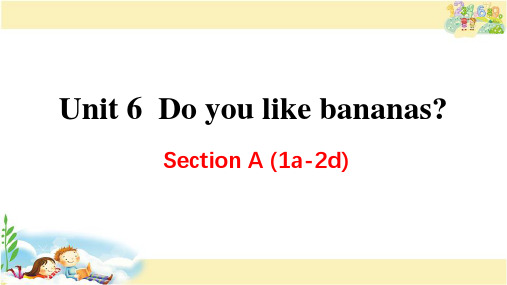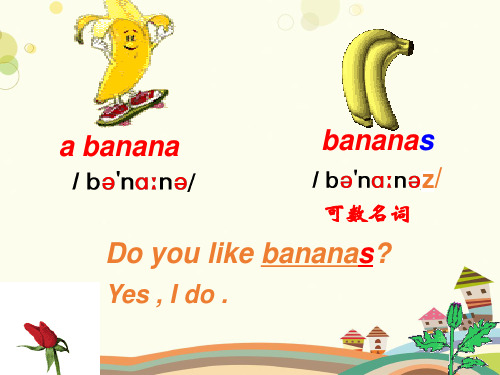七年级英语上册 Unit 6 Do you like bananas(单词+重点句型)语法解析
- 格式:doc
- 大小:62.37 KB
- 文档页数:9

初中英语学习材料madeofjingetiejiUnit 6 Do you like bananas?突破词汇 Section A sure adv . 当然;肯定;一定→P95 Section B breakfast n . 早餐;早饭 →P102 How about...?(提出建议)……怎么样?→P96 healthy adj . 健康的 →P103 Section B eat v . 吃→P101 want v .需要;想要 →P103 well adv . 好;令人满意地→P102 fat adj . 肥的;肥胖的 →P104 把握句型 1.Do you like oranges?你喜欢橙子吗?2.Sure.How about burgers ,vegetable salad ,and some fruit?好吧。
咱们吃汉堡、蔬菜沙拉和水果怎么样?3.I don't want to be fat.我可不想变胖。
熟悉 语法 1.实义动词的一般现在时。
2.名词。
学会 交际 学会在日常生活中谈论好恶。
写作 练笔 学写某人喜爱或厌恶某物的短文。
Section A2dJack :Hey ,John's birthday dinner is next week.[1]Let's think about the food. Tom :[2]Sure.How about burgers ,vegetable salad ,and some fruit? Bill :Sounds good.John likes hamburgers.Jack :Oh ,I don't like salad.Bill :But John likes salad ,and it's his birthday.Jack :Yes ,you're right.What about the fruit?Tom :I think John likes strawberries and apples.Bill :OK.[3]Let's have strawberries and apples then.2d杰克:嗨,约翰的生日聚餐就在下周。





七年级上册英语第六单元复习知识点:Unit6 Do you like bananas1, like+ sth/sb like to do sth like doing sth2, 请吃蔬菜和水果 Please eat vegetables and fruit 蔬菜总是以复数形式出现3, like ···for lunch中餐喜欢··· eat···for breakfast 早餐吃···· 4,可数名词不可数名词可数名词and 不可数名词hamburgers tomatoes French fries orangesbananas strawberries eggs apples carrots pears broccoli ice cream salad chicken5, good 形容词 ---修饰名词 a good girl a good doctor a good teacherwell 副词---修饰动词 play the piano well draw well eat well6, a lot of =lots of + 可数/不可数 many +可数much+不可数7, furniture 家具不可数名词 furniturea piece of furniture 一件家具 a lot of furniture 许多家具句中谓语动词是实义动词的陈述句,变否定形式在实义动词前加don#39;tdoesn#39;t(主语是第三人称单数时用doesn#39;t).like doing sth/like to do sth 喜欢做某事I like swimming. She likes to eat hamburgers.以上就是为大家整理的七年级上册英语第六单元复习知识点:Unit6 Do you like bananas,怎么样,大家还满意吗?希望对大家的学习有所帮助,同时也祝大家学习进步,考试顺利!。
Unit 6Do you like bananas?第一课时Section A(1a-1c)1.重点单词:banana,hamburger,tomato,icecream,salad,strawberry,pear,milk,bread2.重点句式:—Do you like bananas?—Yes,I do.—Do you like salad?—No,I don't.1.用like来谈论喜好2.可数名词的单复数1.用like来谈论喜好2.可数名词的单复数一、预习课本P31新单词并背诵,完成下面的汉译英。
1.香蕉____________ 2.汉堡____________3.西红柿____________ 4.冰激凌__________5.沙拉____________ 6.草莓____________7.梨____________ 8.牛奶____________9.面包____________二、认真预习1a,1b,1c,找出下列句型。
1.—你喜欢香蕉吗?—是的,我喜欢。
________________________________________________________________________ 2.—你喜欢沙拉吗?—不,我不喜欢。
________________________________________________________________________Step 1情景导入Teacher:There are many different kinds of fruits and vegetables in the world,and different people like different food.Everyone has its own taste.What kind of food do you like?What kind of food do you dislike?Today let's talk about the food we like and we dislike in Unit 6.环节说明:由学生感兴趣的话题导入新课,简洁明了,激起学生的学习兴趣。
专业资料整理 Unit6Doyoulikebananas?1.单词分类(1)表水果(fruit ):banana,orange,pear,strawberry,apple(2)表蔬菜(vegetable ):tomato,broccoli,carrot(3)表食物(food ):Frenchfries,hamburger,egg,chicken,dessert(4)三餐:breakfast,lunch,dinner.2.likev.喜欢(1)likesb./sth.喜欢某人/某物,后面跟名词或代词IlikeEnglish.我喜欢英语。
Theyalllikehim.他们都喜欢他。
(2)liketodosth./likedoingsth.喜欢做某事Shelikesswimming.她喜欢游泳。
Shelikestoswim.她喜欢游泳。
(3)prep.像⋯⋯一样。
Don ’ttalklikethat.不要那样说话。
H elookslikehisfather.他看起来像他的父亲。
3.howabout =whatabout+doing/n?(1)表示询问⋯怎么样? Mylittledogisclever,whataboutyourdog?我的小狗很聪明,你的狗怎么样?(2)表示建议如何⋯⋯好吗?Howaboutacupoftea?喝杯茶好吗?W hataboutplayingfootballnow?现在踢足球好吗?4.fruitn.水果,不可数名词水果总称;指个别水果或种类时,是可数名词。
Bananasandapplesarefruit.香蕉和苹果是水果。
Ilikeeatingdifferentfruits:apples,pearsandbananas.5.orange(1)n.可数名词,橙子Shelikesorangesverymuch.她非常喜欢橙子。
n.不可数名词,橙汁Iwanttohaveacupoforange.我想喝杯橙汁。
Unit 6 Do you like bananas 【单词总结】banana/bə'na:nə/n.香蕉hamburger/'hæmbə:gə/n.汉堡包tomato/tə'ma:təu/n.西红柿ice-cream/ais'kri:m/n.冰激凌salad/'sæləd/n.沙拉strawberry/'strɔ:bəri/n.草莓pear/peə/n.梨milk/milk/n.牛奶bread/bred/n.面包birthday/'bə:θdai/n.生日dinner/'dinə/n.(中午或晚上吃的)正餐week/wi:k/n.周;星期think about思考;思索food/fu:d/n.食物sure/ʃuə/adv.当然;肯定;一定How about...?(提出建议)......怎么样?burger/'bə:gə/n.(=hamburger)汉堡包vegetable/'vedʒtəbl/n.蔬菜fruit/fru:t/n.水果right/rait/adj.正确的;适当的apple/'æpl/n.苹果then/ðen/adv.那么egg/eg/n.蛋;鸡蛋c arrot/'kærət/n.胡萝卜rice/rais/n.大米;米饭chicken/'tʃikin/n.鸡肉so/səu/conj.(引出评论或问题)那么breakfast/'brekfəst/n.早餐;早饭lunch/lʌntʃ/n.午餐star/sta:/n.明星;星星eat/i:t/v.吃well/wel/adv.好;令人满意地habit/'hæbit/n.习惯healthy/'helθi/adj.健康的really/'ri:əli/adv.真正地question/'kwestʃən/n.问题want/wɔnt/v.需要;想要be/bi:/v.变成fat/fæt/adj.肥的;肥胖的【短语归纳】1.John’s birthday dinner约翰的生日宴会2.vegetable salad蔬菜沙拉3.two tomatoes两个西红柿4.eat well吃得营养5.think about考虑6.eat/have breakfast/lunch/dinner吃早/午/晚饭7.sports stars体育明星8.the volleyball star排球明星9.ask sb.about sth.问某人某事10.like hamburgers/ice-cream喜欢汉堡包/冰淇淋11.like eating eggs喜欢吃鸡蛋12.her eating habits她的饮食习惯13.be(not)healthy(不)健康14.one last question最后一个问题15.healthy food健康食物16.after breakfast/lunch/dinner早/午/晚饭后。
Unit 6 Do you like bananas?banana 香蕉hamburger 汉堡包tomato 西红柿ice-cream 冰激凌salad 沙拉strawberry 草莓pear 梨milk 牛奶bread 面包birthday 生日dinner (中午或晚上吃的)正餐week 周;星期think about 思考;思索food 食物不可数sure 当然;肯定;一定How about (提出建议)......怎么样?burger 汉堡包vegetable 蔬菜fruit 水果right 正确的;适当的apple 苹果then 那么egg 蛋;鸡蛋carrot 胡萝卜rice 大米;米饭chicken 鸡肉so (引出评论或问题)那么breakfast 早餐;早饭lunch 午餐star 明星;星星eat 吃well 好;令人满意地habit 习惯healthy 健康的really 真正地question 问题want 需要;想要be 变成fat 肥的;肥胖的1.breakfast n.早餐;早饭(表示一日三餐前的词一般不用冠词)【解析】①吃三餐习惯与动词have 连用,且为零冠词,但与形容词连用时,前面要加不定冠词a/an。
have breakfast 吃早饭have a good breakfast 吃一顿丰盛的早餐have a quick breakfast 早餐吃得很快②at breakfast 吃早餐时【扩展】brunch n.早午餐2. well adv.好;令人满意地【解析】常见搭配:do well in…在……做得好辨析good,fine,well,fine.① good 意为“好的,令人满意的”,常指物品的质量,人的品质等方面的好,也常与morning,evening,afternoon等词搭配表示问候。
Alice is a good girl. 爱丽丝是一个好女孩。
②fine:多指身体状况好或天气好等。
在表示问候的交际用语中意为“健康的,身体好的”,在询问天气的交际用语中,意为“晴朗的”③well:常用作副词,说明某个动作做得好;作形容词时只表示身体好,相当于fine.They sing well. 他们唱得好—How is she?—She is very well.= She is very fine.她身体很好。
④nice:强调某人或某物外表好看,给人赏心悦目的感觉;也可表示愉快的心情。
Nice to meet you.That car is very nice . 那辆小汽车很好看(外观美,但是质量不一定好)This car is very good.这辆小汽车很棒(质量好)3.habit n.习惯【解析】①固定搭配:out of habit 出于习惯 eating habits 饮食习惯have a good habit 养成好习惯develop/form the habit of…养成……的习惯break/give up the habit of 戒除……的习惯②比较:habit 和customhabit:可数名词,指个人的习惯、癖好custom:主要指社会或团体的风俗、习惯4.healthy adj.健康的【解析】n. health adv. healthily 健康地反义词:unhealthykeep/stay healthy 保持健康 healthy food 健康食品5.want v. 需要;想要【解析】want to do sth.想做某事want sb. to do sth.想要某人做某事6.fat adj.肥的;肥胖的【解析】反义词:thin 瘦的在英语中人们比较忌讳使用fat这个词,而是委婉的改用其他说法。
如:You are too fat.(×)You are overweight . 你太胖了。
7.question n.问题【解析】①常用搭配:without question 毫无疑问 out of the question 不可能的one last question 最后一个问题②比较question和problem:question:通常指主观上疑惑不解而提出的问题,有待解决或解答的问题,常与ask,answer等连用;此外还可作动词,意为“询问”。
problem:指客观存在等待解决的问题,也可指被提出的问题,指疑难的,困难的问题,如:数学、几何、失业或令人困惑的事等方面的问题,常与solve 后set 等连用。
Can you answer the question?你能回答这个问题吗?The teacher gave them 20 maths problems.老师给他们出了20道数学题。
8.then adv.那么【解析】till/until then 直到那时 from then on 从那时起just then 就在那时(every)now and then 不时,偶尔9.rice n. 大米;米饭不可数名词a grain of rice 一粒大米 rice field 水田;稻田10.chicken【解析】①不可数名词,意为“鸡肉”②可数名词,意为“小鸡”表示肉类的名词:fish 鱼肉 beef 牛肉 pork 猪肉 meat 肉 mutton 羊肉【扩展】hen n.母鸡;cock n. 公鸡11.so conj. (引出评论或问题)那么【解析】①because 引出原因,so 引出结果,但because 和so 不能同时出现。
②常用搭配: so as to 为了,以便 so far 到目前为止so that 以便于;为了 so…that……如此……以至于12.sure adv. 当然;肯定;一定【解析】①作副词,sure 与“certainly”,“of course”同义。
②作形容词,意为“肯定的;确定的;有把握的”,常见的结构有:Sb. be sure of sth./doing sth. “一定/必定将会得到或发生某事”Sb. be sure to do sth. “一定/必然会做或发生某事”Sb. be sure that…“……有把握/确信……”He is sure of passing the test. 他肯定能通过考试。
=He is sure to pass the test.=He is sure that he can pass the test.③常见搭配:for sure 无疑;肯定 make sure 弄清楚;查明be sure to do 务必,一定 be sure of oneself 有自信surely:想必;无疑13.really adv.真正地 adj. real 真的【解析】really是副词,常用来修饰形容词,动词或其他副词,起加强语气的作用。
常位于助动词、系动词的后面,实义动词,形容词或副词的前面。
This book is really good .这本书的确很好。
I really love the dog. 我确实喜欢这只狗。
【扩展】really 还可以单独使用,表示感兴趣,惊讶,怀疑等。
读时用“升调”,意为“真的吗?”—We are going to Hong Kang next month. 我们下个月要去香港。
—Really?真的吗?14.eat v.吃【解析】①eat 既可作及物动词,也可作不及物动词。
eat more vegetables 多吃蔬菜Sports stars eats well. 体育明星吃得好。
We eat these things at noon . 中午我们就吃这些东西。
②区别have 与eat:当后面既有吃的东西,又有喝的东西时,只能用have,不用eat。
I often have two eggs and a glass of milk for breakfast.我早餐经常吃一个鸡蛋喝一杯牛奶eat:指用最咀嚼、吞咽,后面常接固体食物drink:指用嘴直接喝,而非吸管等,后面跟液体食物have:既可以跟液体食物(相当于eat),还可以跟液体食物(相当于drink)take:表示“服药”,呼吸空气等。
如:take medicine15.right adj.正确的;适当的【解析】①n. 右边(反义词:left 左边);adj. 右边的on the right 在右边 turn right 向右转②常见用法:Right.对的That’s right.对的All right 好吧(表同意)That’s all right.没关系/不用谢= Not at all=That’s OKright away 立即;马上16.fruit n.水果【解析】表示水果总称时,无复数形式,谓语动词用单数;但表示各种水果用复数形式“fruits”。
Some fruit is sweet .有些水果是甜的。
17.then adv.那么【解析】①通常放在句首或句尾,用来缓和语气。
What do you think of it then?那么你如何看待这件是呢?Then ,let’s go.那么,我们走吧。
②还有“那时;然后”的意思。
但then 一般不能用来单独连接两句话,此时需在then 前面加and。
We eat hot dogs first,and then we drink orange juice.我们先吃了热狗,然后喝了橙汁。
18.salad n.沙拉【解析】①作不可数名词,视为物质,意为“沙拉”。
Sometime I have salad for supper . 有时候我晚饭吃沙拉。
②作可数名词,意为“一份沙拉”或“一盘沙拉”。
Let’s make a salad .让我们做一份沙拉。
19.dinner n.(中午或晚上)吃的正餐【解析】指一日之中较丰富的正餐(晚餐或午餐),而breakfast,lunch ,supper则指具体的早、午、晚餐。
dinner party 宴会20.food n.食物【解析】①作不可数名词,表示泛指的食物。
I’m hungry .I need some food.我饿了。
我需要一些食物。
②作可数名词,指具体的“特定种类的食品”。
I like different kinds of foods. 我喜欢不同种类的食品。
③常用搭配: junk food 垃圾食品 fast food 快餐21.week n.周;星期【解析】常见搭配:next week 下周 this week 本周 last week 上周【扩展】weekend n.周末 weekday. 工作日second 秒— minute 分—hour 小时—day 天—week周—month月—year 年—century 世纪22.like v.喜欢【解析】①v.喜欢 like doing sth./to do sth. 喜欢做某事②prep. 像…… look like 看起来像……k n.牛奶、【解析】①不可数名词,意为“牛奶”,如fresh milk 鲜奶。